Tunisia: Chokri Belaid murder prompts PM to dissolve government


Chokri Belaid, 48 – a lawyer and human rights activist – was gunned down in his car outside his Tunis home.
When news of his murder broke, protesters took to the streets and the headquarters of the ruling Ennahda party, a moderate Islamist faction, was set ablaze.
Advertisement
Hide AdAdvertisement
Hide AdMr Belaid had criticised the government for its links to radical Islamists and the gulf state of Qatar. His Popular Front bloc and other opposition groups said they would walk out of the constituent assembly, which is writing a new constitution following the ousting of Zine el-Abidine Ben Ali in 2011. A general strike was called for today, when Mr Belaid’s burial is due to take place.
Prime minister Hamadi Jebali condemned the killing as a blow against the Arab Spring. Last night, he made an announcement on state television, saying: “After the failure of negitiations on a Cabinet reshuffle, I have decided to form a small technicratic government.”
The move, he said, was a response to the crisis as anti-Islamist feeling spilled into street violence, two years after the Jasmine revolution toppled autocrat Ben Ali and sparked the Arab Spring.
Mr Belaid died in hospital after being taken there by ambulance. His wife was at his bedside.
Later, police fired tear gas at some 20,000 protesters outside the interior ministry, demanding the government step down.
“This is a black day in the history of modern Tunisia … Today we say to the Islamists, ‘get out’ … enough is enough,” said Souad, a 40-year-old teacher outside the ministry. “Tunisia will sink in the blood if you stay in power.”
Despite calls for calm from the president, who is not an Islamist, thousands demonstrated in the cities of Mahdia, Sousse, Monastir and Sidi Bouzid, the cradle of the revolution, where police fired tear gas and warning shots at protesters who set cars and a police station on fire.
While Mr Belaid’s nine-party Popular Front bloc has only three seats in the assembly, the opposition agreed to withdraw its 90 or so members. Ennahda and its coalition partners have 120 seats.
Advertisement
Hide AdAdvertisement
Hide AdTunisia was the first Arab country to kick out its dictator and hold free elections as uprisings spread around the region in 2011, leading to the fall of autocrats in Egypt, Yemen and Libya and to civil war in Syria. But as in Egypt, many who campaigned for freedom under autocratic rulers and better prospects now feel their revolutions have been hijacked by Islamists they accuse of clamping down on liberties, with no sign of new jobs or improvements in infrastructure.
Tunisia’s new constitution was intended to pave the way for new elections but had heightened tensions between secularists and Islamists, just as it has in Egypt. The ruling parties in Tunisia had agreed to a vote in June, but the timing now rests with Mr Jebali, who pledged last night to expedite this and chose non-partisan figures for his interim administration.
Since the uprising, the government has faced protests over economic hardship and Tunisia’s future path, with many complaining hardline Salafists were taking over the revolution in the former French colony.
Mr Belaid said earlier this week that dozens of people close to the government had attacked a Popular Front meeting in Kef, northern Tunisia, on Sunday.
Ennahda leader Rached Ghannouchi blamed anti-democratic forces for the killing: “We should not fall into a spiral of violence. We need unity.”